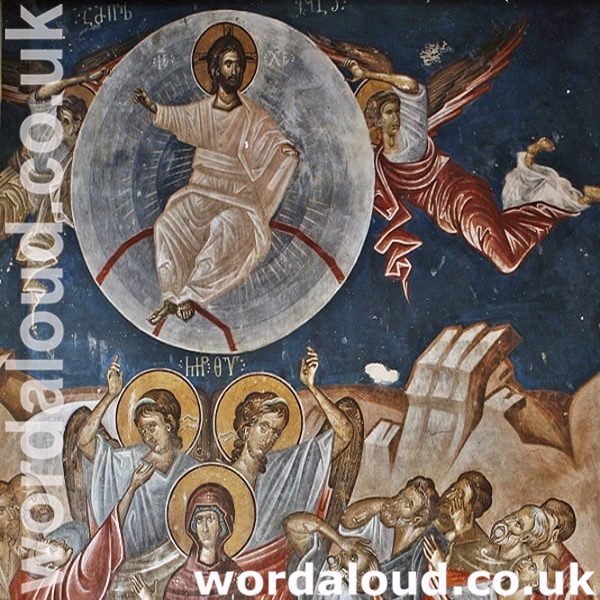Christian Art | The Last Supper | Institution Of The Eucharist | Taste And See That The Lord Is Good
Office Of Readings | Week 21, Wednesday, Ordinary Time | A Reading From The Instructions Of Saint Columban | Taste And See The Goodness Of The Lord
‘Let him who thirsts come to me and drink.’
Saint Columban (c. 543–615) was an Irish monk and missionary whose work helped to shape early medieval monasticism in continental Europe. His writings, including sermons and monastic rules, reveal a spirituality that is both ascetic and deeply scriptural. The passage we have today develops a theme central to his teaching: the inexhaustible desire for Christ as the fountain of life and bread of life.
Columban begins by addressing the image of thirst. He urges his hearers not to extinguish their thirst but to let it grow deeper. This paradox reflects the Christian belief that the more the soul drinks from Christ, the more it longs for him. He cites Jeremiah 2:13, where the Lord rebukes his people for forsaking ‘the fountain of living water’ and connects this with the New Testament image of Christ as both fountain and bread (John 6; John 7:37–39). Columban’s interpretation shows the unity of these biblical images: Christ nourishes and refreshes, but never in such a way that desire is finally exhausted.
This unending thirst is not a defect but a sign of the infinity of God. Human desire is stretched out by the encounter with Christ, and this process never ends. This same theme is found in other patristic writers, such as Gregory of Nyssa, who described the soul’s eternal journey into God as a continual ‘stretching forward’ (epektasis). For Columban, thirst is itself a form of love: ‘he drinks who loves him fully and really desires him.’ To thirst for Christ is to be set on fire with the love of wisdom, and this desire becomes the very energy of the Christian life.
Columban then links the fountain with the bread of life. Both are images of Christ, both feed and sustain, both are received above all in the Eucharist. Here the theology of the sacrament is present though not stated directly: in receiving Christ, Christians are fed and refreshed, but the gift is inexhaustible. Unlike earthly food and drink, which satisfy and then are consumed, Christ as bread and fountain remains eternal. This resonates with the patristic tradition that stressed the Eucharist as both nourishment and promise of eternal life (cf. Augustine, Confessions VII, and Cyril of Jerusalem’s Eucharistic catecheses).
Columban also draws attention to the biblical call to ‘taste and see’ (Psalm 34[33]:8). For him, tasting the Lord is not a one-time act but the beginning of a desire that deepens without end. Hunger and thirst, far from being removed, are transfigured into the unending longing that is part of eternal life. The more one drinks, the more one thirsts; the more one eats, the more one hungers. This teaching not only reflects a theology of the Eucharist but also offers a way of describing the spiritual life more broadly: prayer, meditation on Scripture, and monastic discipline all function to intensify rather than diminish desire for God.
Columban frames this teaching with practical exhortation. He urges Christians always to ‘long for, seek and love the Word of God on high, the fountain of wisdom’. The appeal is universal: the thirsty are all called to drink, and the hungry to eat. What unites them is desire. The believer who tastes Christ never possesses him fully but is drawn ever deeper into communion.

A Reading From The Instructions Of Saint Columban | Taste And See The Goodness Of The Lord
My dear brethren, listen to my words. You are going to hear something that must be said. You quench your soul’s thirst with drafts of the divine fountain. I now wish to speak of this. Revive yourself, but do not extinguish your thirst. Drink, I say, but do not entirely quench your thirst, for the fountain of life, the fountain of love calls us to him and says: Whoever thirsts, let him come to me and drink.
Understand well what you drink. Jeremiah would tell us; the fountain of life would himself tell us; For they abandoned me, the fountain of living water, says the Lord. The Lord himself, our God Jesus Christ, is the fountain of life, and accordingly he invites us to himself as to a fountain, that we may drink. Whoever loves him, drinks him; he drinks who is filled with the Word of God, he drinks who loves him fully and really desires him. He drinks who is on fire with the love of wisdom.
Consider the source of the fountain; bread comes down to us from the same place, since the same one is the bread and the fountain, the only-begotten Son, our God, Christ the Lord, for whom we should always hunger. We may even eat him out of love for him, and devour him out of desire, longing for him eagerly. Let us drink from him, as from a fountain, with an abundance of love. May we drink him with the fullness of desire, and may we take pleasure in his sweetness and savor.
For the Lord is sweet and agreeable; rightly then let us eat and drink of him yet remain ever hungry and thirsty, since he is our food and drink, but can never be wholly eaten and consumed. Though he may be eaten, he is never consumed; one can drink of him and he is not diminished because our bread 8is eternal and our fountain is sweet and everlasting. Hence the prophet says: You who thirst, go to the fountain. He is the fountain for those who are thirsty but are never fully satisfied. Therefore he calls to himself the hungry whom he raised to a blessed condition elsewhere. They were never satisfied in drinking; the more they drank, the greater their thirst.
It is right, brothers, that we must always long for, seek and love the Word of God on high, the fountain of wisdom. According to the Apostle’s words all the hidden treasures of wisdom and knowledge are in him, and he calls the thirsty to drink.
If you thirst, drink of the fountain of life; if you are hungry, eat the bread of life. Blessed are they who hunger for this bread and thirst for this fountain, for in so doing they will desire ever more to eat and drink. For what they eat and drink is exceedingly sweet and their thirst and appetite for more is never satisfied. Though it is ever tasted it is ever more desired. Hence the prophet-king says: Taste and see how sweet, how agreeable is the Lord.
Christian Prayer With Jesus Christ
Lord Jesus Christ, fountain of life and bread of heaven,
draw us to yourself with unending desire.
Let our hunger for your Word and our thirst for your Spirit never be quenched,
but lead us ever deeper into your wisdom and your love.
May we find in you our nourishment and refreshment,
until the day when we see you face to face,
who live and reign with the Father and the Holy Spirit,
one God, for ever and ever.
Amen.
Glossary Of Christian Terms
Fountain of living water – A biblical image (Jeremiah 2:13; John 7:37–39) for God as the source of life, truth, and refreshment. In Christian interpretation, Christ is identified as this fountain.
Bread of life – A title for Christ drawn from John 6:35, where Jesus declares himself to be the true bread that gives eternal life. Closely associated with the Eucharist.
Wisdom – More than intellectual knowledge; in biblical thought, wisdom is the gift of God that enables right living, and in Christian tradition it is identified with Christ as the eternal Word (cf. 1 Corinthians 1:24).
Eucharist – The sacrament of Christ’s body and blood, in which the faithful receive Christ under the signs of bread and wine. Underlies Columban’s imagery of eating and drinking Christ.
Taste and see – From Psalm 34[33]:8, an invitation to experience the goodness of the Lord. Early Christian writers often used it to describe the experience of the Eucharist.
Saint Columban (c. 543–615) – An Irish monk and missionary active in Gaul (modern France), Switzerland, and Italy. Known for his ascetic rule, missionary preaching, and writings on spiritual life.








